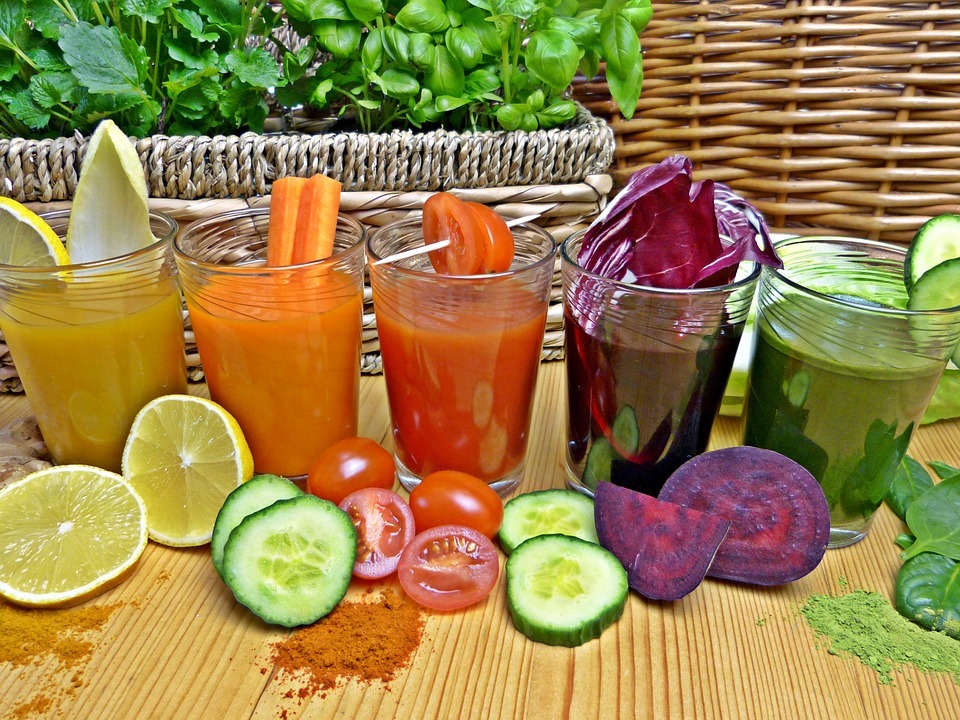Alfalfa Sprouts Juice: A Nutrient-Packed Drink for Overall Health
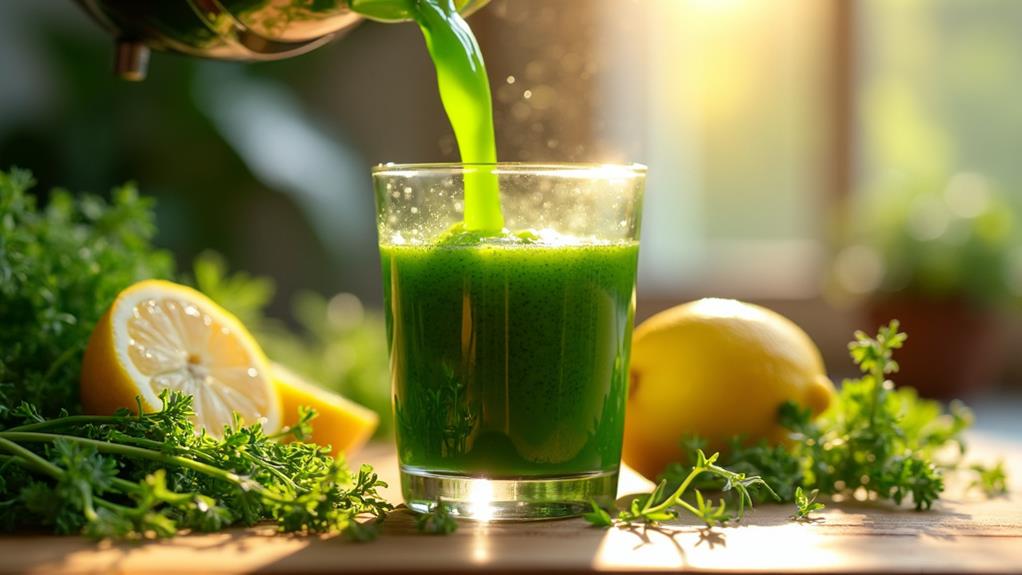
Alfalfa sprouts juice is a nutrient-packed powerhouse, offering vitamins A, C, E, and K, along with vital minerals like calcium and iron. Drinking it can support digestive health thanks to its fiber content, which also helps manage blood sugar levels. The saponins in alfalfa sprouts may help lower bad cholesterol while elevating the good kind. Plus, its antioxidants fight oxidative stress and inflammation, strengthening your immune system and overall wellness. Use a masticating juicer for the best nutrient extraction, and try mixing it with fruits or veggies for a revitalizing twist. Uncover how this juice can further improve your well-being.
Nutritional Profile of Alfalfa Sprouts
When you engage yourself in the nutritional profile of alfalfa sprouts, you'll quickly find they're packed with health benefits despite being low in calories. With only 8 calories per cup (33g), alfalfa sprouts make for a guilt-free supplement to your diet. They deliver 1g of protein and 0.6g of fiber per serving, ensuring you get a good mix of nutrients without overloading your calorie intake.
Alfalfa sprouts are a fantastic source of vitamins, particularly vitamin K, providing about 13% of the daily recommended intake. This vitamin is vital for blood clotting and maintaining strong bones. Alongside vitamins, these sprouts are rich in important minerals like copper, manganese, folate, and iron, supporting blood circulation and cellular health.
The fiber content in alfalfa sprouts plays a significant role in digestion and can help regulate blood sugar levels, which is beneficial for weight management and diabetes control. Moreover, alfalfa sprouts contain bioactive compounds such as saponins, flavonoids, and phytoestrogens, contributing to their antioxidant properties. These antioxidants help combat oxidative stress, promoting general health. With their impressive nutritional profile, incorporating alfalfa sprouts into your meals can enhance your wellbeing without extra calories.
Health Benefits of Alfalfa Juice
You might be surprised by the multitude of health benefits packed into alfalfa juice. Rich in necessary nutrients, alfalfa juice is a powerhouse for your general health. It's low in calories but high in vitamins like A, C, E, and K, along with significant minerals such as calcium and iron. These nutrients support immune function and help maintain your body's energy.
The high fiber content in alfalfa juice aids digestion and helps regulate blood sugar levels. This makes it an excellent choice if you're managing diabetes or prediabetes. By stabilizing blood sugar, it promotes a healthier metabolic state.
Alfalfa juice is also known for its ability to improve cholesterol levels. It contains saponins, compounds that can lower LDL (bad) cholesterol and potentially increase HDL (good) cholesterol. This shift may reduce your risk of heart disease, contributing to better cardiovascular health.
Furthermore, alfalfa juice is packed with antioxidants, which combat oxidative stress and help lower the risk of chronic diseases like cancer and cardiovascular conditions. By incorporating alfalfa juice into your diet, you're not just enjoying a revitalizing drink, but also supporting your body's health and resilience.
Antioxidant and Anti-inflammatory Effects
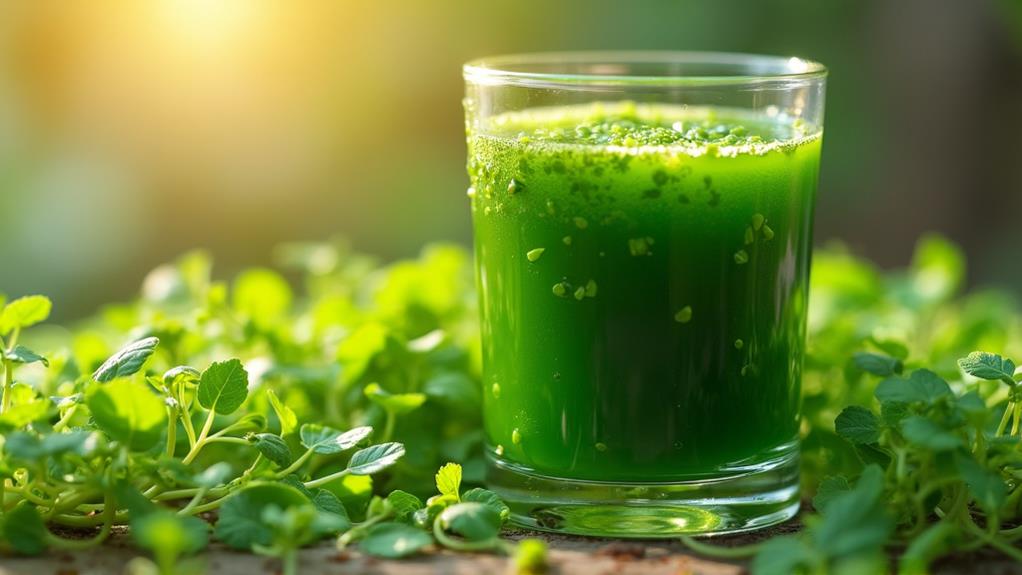
Numerous studies highlight the potent antioxidant and anti-inflammatory properties of alfalfa sprouts juice. These sprouts are packed with antioxidants like flavonoids and phenolic acids that actively combat oxidative stress in your body, protecting your cells from potential damage. This protection is essential in maintaining general health and preventing conditions like cancer and cardiovascular diseases. The high levels of vitamin C found in alfalfa sprouts juice further support your immune system, bolstering its defenses against common illnesses.
In addition to antioxidants, alfalfa sprouts also contain powerful anti-inflammatory properties. These properties help reduce inflammation, which is a root cause of many chronic diseases. Regular consumption of alfalfa sprouts juice can aid in mitigating inflammation-related issues, contributing to a healthier lifestyle. The saponins present in alfalfa are particularly notable for their potential to inhibit the absorption of cholesterol. This action not only aids in lowering cholesterol levels but also reduces inflammation associated with heart disease, promoting better heart health.
Juicing Techniques for Maximum Nutrition
Achieving ideal nutrition from alfalfa sprouts juice requires thoughtful juicing techniques. Start by using a masticating juicer for peak extraction. This type of juicer preserves enzymes and minimizes heat exposure, guaranteeing you get the most nutrients possible. Before juicing, thoroughly rinse your alfalfa sprouts under running water to remove dirt and any potential bacterial contaminants. Doing so not only guarantees safety but also improves the juice's general quality.
To elevate the nutrient availability and enhance juicing efficiency, soak alfalfa seeds for 8-12 hours before sprouting. This simple step can make a significant difference in the nutritional output of your juice. For a balanced flavor profile and to maximize nutritional diversity, pair your alfalfa sprout juice with complementary fruits and vegetables like apples or spinach. This combination adds complexity to the taste while enriching the nutrient content.
Once you've prepared your juice, store it in air-tight containers to maintain its freshness. Consider adding a splash of lemon juice, which can help retain its nutritional integrity and slightly extend its shelf life. Store freshly juiced alfalfa immediately to enjoy its full health benefits.
Incorporating Alfalfa Juice in Diet

Incorporating alfalfa juice into your diet can be both simple and rewarding. This nutrient-dense juice is packed with vital nutrients and is low in calories, making it a fantastic supplement to your daily routine. Not only does it support total well-being with its vitamins and antioxidants, but it also aids in cholesterol management and blood sugar regulation. Here's how you can easily incorporate alfalfa juice into your meals:
- Smoothies: Add alfalfa juice to your smoothies for a vitamin boost. Its high content of vitamins K and C enriches the nutritional profile without adding extra calories.
- Refreshing Beverages: Combine alfalfa juice with vegetable juices like carrot or cucumber to create a hydrating and nutrient-packed drink.
- Salad Dressings: Use alfalfa juice as a base for salad dressings. It offers a flavorful alternative to oils, improving your salads with its nutrient density.
- Soups and Marinades: Improve the flavor of homemade soups or marinades by incorporating alfalfa juice. It contributes health benefits while supporting healthy digestion due to its fiber content.
Safety and Side Effects Considerations
In relation to enjoying alfalfa sprouts juice, it's significant to be aware of potential safety concerns and side effects. Alfalfa sprouts, while nutritious, carry a risk of foodborne illness, particularly from Salmonella. Proper handling and rinsing are vital to minimize these health risks. Pregnant and breastfeeding women, along with those having autoimmune disorders, should steer clear of raw alfalfa sprouts due to potential complications and increased immune activity.
If you're on blood thinners like warfarin, alfalfa sprouts' high vitamin K content can interfere with medication effectiveness. A consultation with a healthcare provider is important to make certain your regimen remains safe and effective. You might also experience side effects such as gastrointestinal discomfort, including gas and diarrhea, due to the sprouts' high fiber content.
Those with hormone-sensitive conditions should exercise caution, as alfalfa sprouts contain phytoestrogens that might affect hormone levels. It's wise to monitor your body's reactions and consult with a healthcare professional if concerns arise. By staying informed and cautious, you can enjoy alfalfa sprouts juice safely while reaping its potential health benefits.
Alfalfa Juice Recipes and Ideas
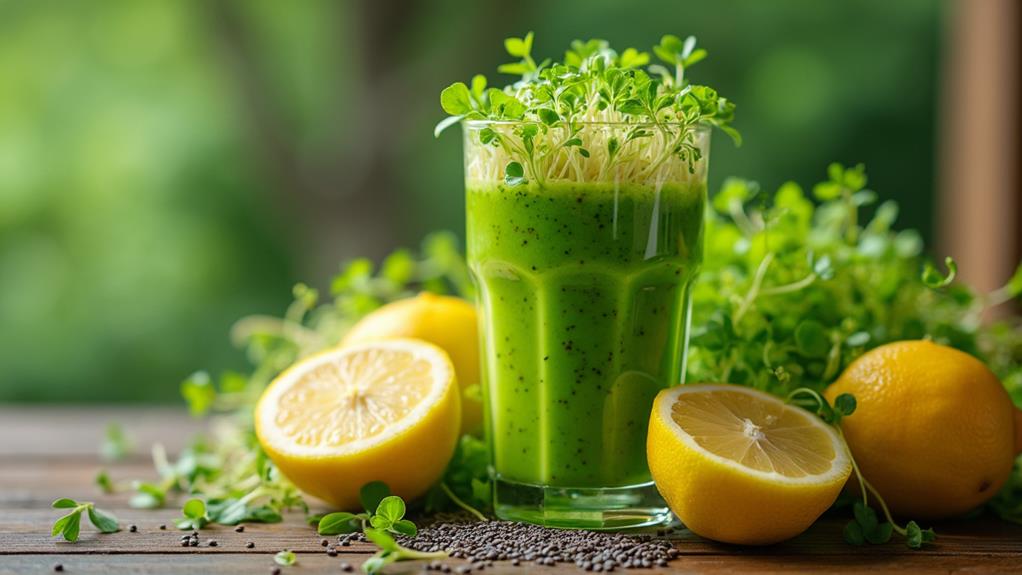
In terms of making alfalfa juice a flavorful improvement to your diet, blending it with fruits like apples or pineapples can elevate both the flavor and nutritional content. This creates a nutrient-dense smoothie that maintains a low sugar profile, perfect for a morning lift or a revitalizing afternoon treat. You can also mix alfalfa juice with cucumber and lemon for a hydrating drink that supports detoxification—ideal for staying cool in the summer.
Consider these ideas to incorporate alfalfa juice into your meals and drinks:
- Smoothies: Blend alfalfa juice with spinach and a banana for a smoothie rich in vitamins A, C, and K, plus dietary fiber.
- Salad Dressings: Improve your salads by mixing alfalfa juice with olive oil, vinegar, and herbs for a unique, nutrient-packed dressing.
- Hydrating Drinks: Combine alfalfa juice with cucumber and lemon for a zesty, detoxifying drink that's perfect for comprehensive health.
- Marinades: Use alfalfa juice as a base for marinades, blending it with soy sauce, garlic, and ginger to flavor grilled veggies or proteins.
Potential Interactions With Medications
Understanding potential interactions between alfalfa sprouts and medications is vital for those considering adding this nutritious juice to their diet. Alfalfa sprouts contain high levels of vitamin K, which can interfere with anticoagulant medications like warfarin, potentially increasing the risk of blood clotting. If you're taking such medications, monitoring your health effects closely is imperative. Moreover, the phytoestrogens in alfalfa may alter hormone levels in individuals on estrogen-containing contraceptives. This could lead to unexpected changes, so it's wise to be cautious.
Additionally, alfalfa may improve the effects of antidiabetic medications, potentially causing hypoglycemia. If you're on these drugs, regularly check your blood sugar levels to avoid complications. The immune-boosting properties of alfalfa can also interact with immunosuppressive medications, possibly counteracting their intended effects. Such interactions could compromise your health if you're managing chronic conditions.
To guarantee your safety and well-being, consult your healthcare provider before adding alfalfa sprouts or juice to your diet. Discuss any potential interactions with medications you're currently taking. By doing so, you can enjoy the benefits of this nutrient-packed drink without compromising your health.
Research and Future Directions
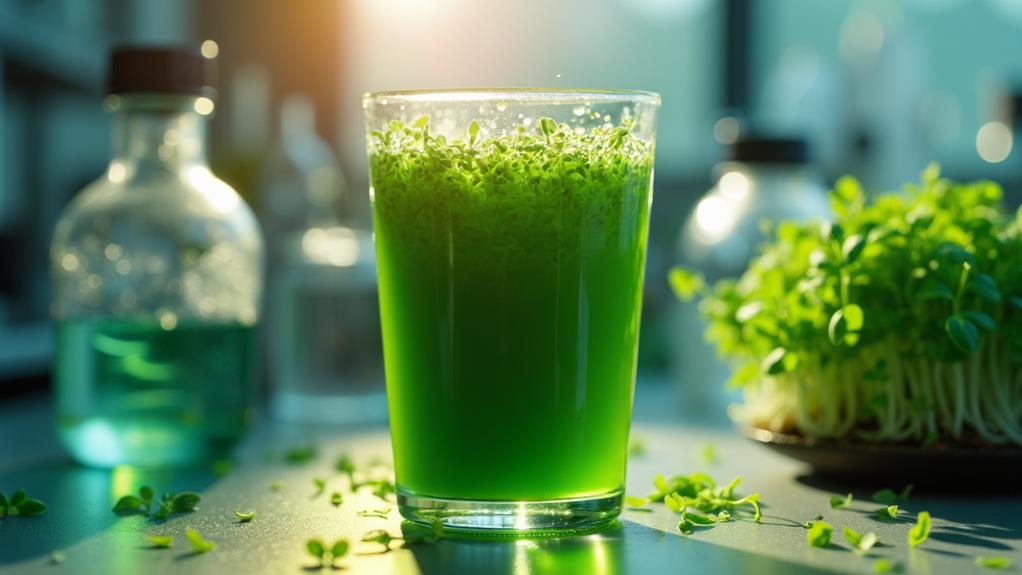
Research on alfalfa sprouts juice is revealing exciting possibilities, especially its potential antioxidant properties that could combat oxidative stress and promote general health. Recent studies are investigating its bioactive compounds, but the expedition is just beginning. With limited clinical trials, researchers are enthusiastic to examine its effectiveness in managing diabetes and dyslipidemia. Imagine a future where alfalfa sprouts become a staple in chronic disease management. But there's more to uncover!
- Phytoestrogens' Promise: These compounds in alfalfa are showing potential for easing menopausal symptoms and enhancing male fertility.
- Foodborne Illness Concerns: The CDC's findings link alfalfa sprouts to outbreaks, emphasizing the need for safe growing practices.
- Nutritional Profile Investigation: Revealing the best ways to prepare alfalfa sprouts juice could optimize its health benefits.
- Chronic Disease Management: As a dietary intervention, alfalfa sprouts juice might play a vital role in preventing long-term health issues.
The future of alfalfa sprouts research is bright, with promising directions in nutritional studies and safe consumption practices. Keep an eye on these developments for a healthier tomorrow!




